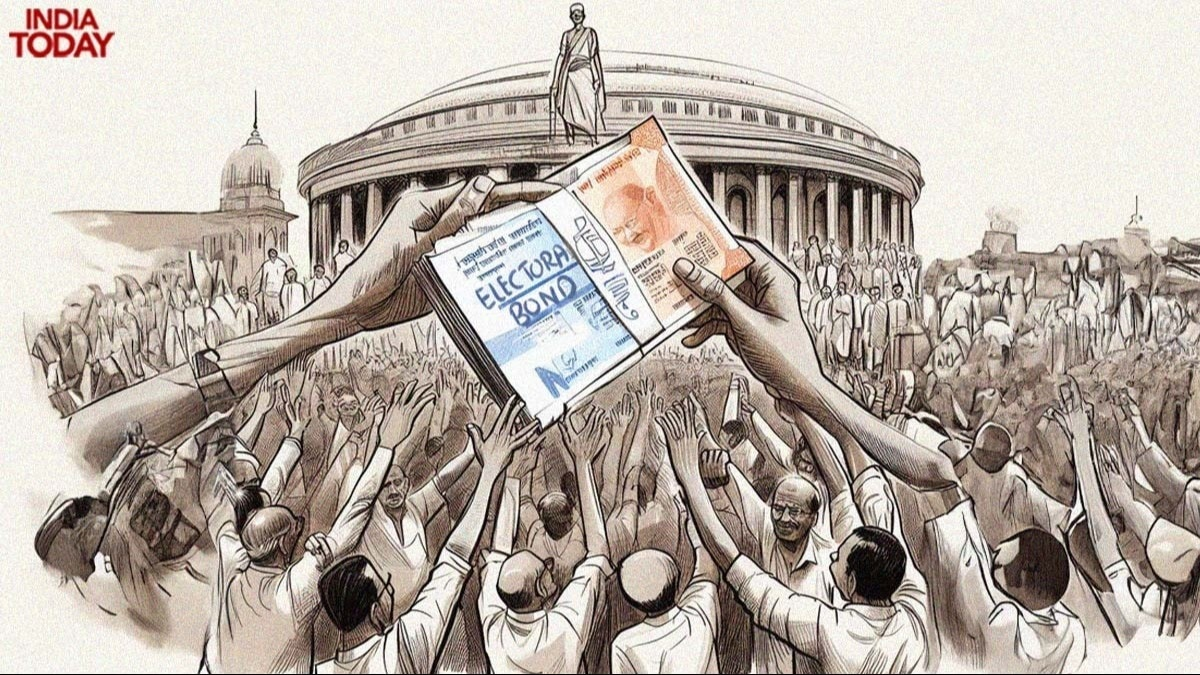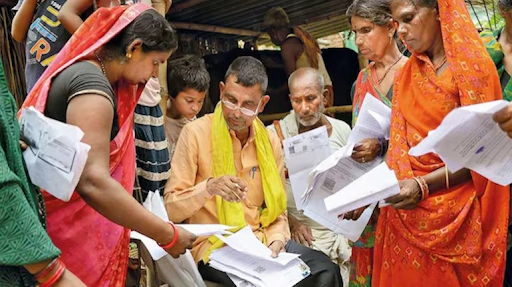Description

Copyright infringement not intended
Picture Courtesy: India Today
Context: The Supreme Court reserved its judgment regarding the challenge to the central government's Electoral Bonds Scheme.
Details
- The Supreme Court has reserved its verdict on the petition challenging the Electoral Bonds Scheme of the central government, which was introduced in 2018.
- The Electoral Bonds Scheme is not the first attempt to regulate donations to political parties by individuals and corporations. In 2013, the government introduced the Electoral Trusts Scheme, which also aimed to facilitate such donations. However, there is a key difference between the two schemes.
- The Electoral Trusts Scheme mandated that the electoral trusts, which received contributions from donors, had to disclose to the Election Commission of India the details of the donors and the parties that received the donations every year.
- The Electoral Bonds Scheme, on the other hand, allows the donors to remain anonymous, thus raising concerns about transparency and accountability in political funding.
Electoral Bonds (EB) Scheme
Introduction and Purpose
- The Electoral Bonds Scheme was introduced by the Government of India in 2018 as a method to channel political donations transparently.
- The primary objective was to cleanse the system of political funding by allowing individuals and corporations to donate to political parties using these bonds, which were essentially bearer instruments like promissory notes.
Anonymity of Donors
- One of the main features of the Electoral Bonds Scheme was the anonymity it provided to donors. Donors could purchase these bonds from authorized banks without revealing their identity.
- This anonymity raised concerns about transparency, as it made it difficult to trace the source of political funding, potentially allowing for undisclosed and unaccounted contributions.
Usage and Criticisms
- Political parties could encash these bonds in registered accounts and the money would be credited to their accounts without revealing the identity of the donor.
- Critics argued that this lack of transparency could lead to the possibility of black money being funnelled into political parties, undermining the democratic process and the principle of transparency in political funding.
Supreme Court Hearing and Challenges
- The Supreme Court of India held a three-day hearing on the challenge to the Electoral Bonds Scheme, where arguments were presented both in favour of and against the scheme.
- Various stakeholders, including political parties, activists, and legal experts, voiced their concerns about the scheme's impact on transparency and accountability in the political funding process.

Electoral Trusts (ET) Scheme
Introduction and Reporting Requirements
- The Electoral Trusts Scheme was introduced by the government in 2013 to bring more transparency to political donations.
- Under this scheme, electoral trusts were established entities that collected donations from individuals and corporations and distributed the funds to political parties.
- Electoral trusts were mandated to submit annual reports to the Election Commission of India, disclosing details of contributions received from individuals and companies, as well as the donations made to political parties.
Transparency and Accountability
- The reporting requirements of the Electoral Trusts Scheme ensured that there was a level of transparency regarding the sources of political funding and the utilization of these funds by political parties.
- Donors to electoral trusts were known entities, and their contributions were recorded and reported, allowing for a certain degree of accountability in the funding process.
Implications and Challenges
Transparency vs. Anonymity
- The key challenge lies in striking a balance between ensuring the anonymity of donors (as provided by the Electoral Bonds Scheme) and maintaining transparency and accountability in the political funding process (as encouraged by the Electoral Trusts Scheme).
- Balancing these aspects is crucial for upholding democratic values and ensuring the integrity of the electoral system.
Judicial Review and Decision
- The Supreme Court's decision on the challenge to the Electoral Bonds Scheme holds significant importance. Depending on the judgment rendered, there could be potential reforms or changes in the existing system to address the concerns raised by various stakeholders.
Public Discourse and Reforms
- Public discourse surrounding these schemes has led to discussions on electoral reforms, campaign finance regulations, and the need for a more transparent and accountable political funding system.
- Reforms in this area are essential to uphold the democratic process and ensure that political parties operate with integrity and are accountable to the citizens they represent.
.jpg)
Conclusion
- The Electoral Bonds Scheme focused on providing donor anonymity, raising concerns about transparency, while the Electoral Trusts Scheme aimed to ensure transparency through reporting requirements, albeit with some level of donor privacy. The balance between these two aspects has been a central point of debate and discussion in the context of political funding in India.
Must Read Articles:
ELECTORAL BONDS: https://www.iasgyan.in/daily-current-affairs/electoral-bonds-34
|
PRACTICE QUESTION
Q. What are the key challenges and debates surrounding political funding in India, particularly in light of schemes like the Electoral Bonds Scheme and the need for transparency in the political financing process?
|








